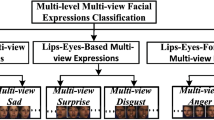Abstract
We propose a view-constrained latent variable model for multi-view facial expression classification. In this model, we first learn a discriminative manifold shared by multiple views of facial expressions, followed by the expression classification in the shared manifold. For learning, we use the expression data from multiple views, however, the inference is performed using the data from a single view. Our experiments on data of posed and spontaneously displayed facial expressions show that the proposed approach outperforms the state-of-the-art methods for multi-view facial expression classification, and several state-of-the-art methods for multi-view learning.
Access this chapter
Tax calculation will be finalised at checkout
Purchases are for personal use only
Preview
Unable to display preview. Download preview PDF.
Similar content being viewed by others
References
Zeng, Z., Pantic, M., Roisman, G., Huang, T.: A survey of affect recognition methods: Audio, visual, and spontaneous expressions. IEEE Trans. on PAMI 31, 39–58 (2009)
Zhu, Z., Ji, Q.: Robust real-time face pose and facial expression recovery. In: IEEE Int’l Conf. on CVPR, pp. 681–688 (2006)
Moore, S., Bowden, R.: Local binary patterns for multi-view facial expression recognition. CVIU 115, 541–558 (2011)
Hu, Y., Zeng, Z., Yin, L., Wei, X., Tu, J., Huang, T.S.: A study of non-frontal-view facial expressions recognition. In: ICPR, pp. 1–4 (2008)
Hesse, N., Gehrig, T., Gao, H., Ekenel, H.K.: Multi-view facial expression recognition using local appearance features. In: ICPR, pp. 3533–3536 (2012)
Rudovic, O., Pantic, M., Patras, I.: Coupled gaussian processes for pose-invariant facial expression recognition. IEEE Trans. on PAMI 35, 1357–1369 (2013)
Rudovic, O., Patras, I., Pantic, M.: Regression-based multi-view facial expression recognition. In: Proc. of ICPR, pp. 4121–4124 (2010)
Zheng, W., Tang, H., Lin, Z., Huang, T.S.: Emotion recognition from arbitrary view facial images. In: Daniilidis, K., Maragos, P., Paragios, N. (eds.) ECCV 2010, Part VI. LNCS, vol. 6316, pp. 490–503. Springer, Heidelberg (2010)
Tariq, U., Yang, J., Huang, T.S.: Multi-view facial expression recognition analysis with generic sparse coding feature. In: Fusiello, A., Murino, V., Cucchiara, R. (eds.) ECCV 2012 Ws/Demos, Part III. LNCS, vol. 7585, pp. 578–588. Springer, Heidelberg (2012)
Ojala, T., Pietikainen, M., Maenpaa, T.: Multiresolution gray-scale and rotation invariant texture classification with local binary patterns. IEEE Trans. on PAMI 24, 971–987 (2002)
Cortes, C., Vapnik, V.: Support-vector networks. Machine Learning, 273–297 (1995)
Cootes, T.F., Edwards, G.J., Taylor, C.J., et al.: Active appearance models. IEEE Trans. on PAMI 23, 681–685 (2001)
Lowe, D.: Object recognition from local scale-invariant features. In: ICCV, vol. 2, pp. 1150–1157 (1999)
Yang, J., Yu, K., Gong, Y., Huang, T.: Linear spatial pyramid matching using sparse coding for image classification. In: IEEE Conf. on CVPR, pp. 1794–1801 (2009)
Eleftheriadis, S., Rudovic, O., Pantic, M.: Shared gaussian process latent variable model for multi-view facial expression recognition. In: Bebis, G., et al. (eds.) ISVC 2013, Part I. LNCS, vol. 8033, pp. 527–538. Springer, Heidelberg (2013)
Shon, A., Grochow, K., Hertzmann, A., Rao, R.: Learning shared latent structure for image synthesis and robotic imitation. NIPS 18, 1233 (2006)
Bertsekas, D.P.: Constrained optimization and lagrange multiplier methods. Computer Science and Applied Mathematics. Academic Press, Boston (1982)
Ek, C., Lawrence, P.: Shared Gaussian Process Latent Variable Models. PhD thesis. Oxford Brookes University (2009)
Rasmussen, C., Williams, C.: Gaussian processes for machine learning, vol. 1. MIT Press, Cambridge (2006)
Urtasun, R., Darrell, T.: Discriminative gaussian process latent variable model for classification. In: ICML, pp. 927–934. ACM (2007)
Sundararajan, S., Keerthi, S.S.: Predictive approaches for choosing hyperparameters in gaussian processes. Neural Computation 13, 1103–1118 (2001)
Gross, R., Matthews, I., Cohn, J., Kanade, T., Baker, S.: Multi-pie. Image and Vision Computing 28, 807–813 (2010)
Belhumeur, P.N., Jacobs, D.W., Kriegman, D.J., Kumar, N.: Localizing parts of faces using a consensus of exemplars. In: IEEE Conf. on CVPR, pp. 545–552 (2011)
Sagonas, C., Tzimiropoulos, G., Zafeiriou, S., Pantic, M.: A semi-automatic methodology for facial landmark annotation. In: CVPR-W 2013 (2013)
Bishop, C.M.: Pattern recognition and machine learning, vol. 4. Springer (2006)
Zheng, Z., Yang, F., Tan, W., Jia, J., Yang, J.: Gabor feature-based face recognition using supervised locality preserving projection. Signal Processing 87 (2007)
Zhong, G., Li, W.-J., Yeung, D.-Y., Hou, X., Liu, C.-L.: Gaussian process latent random field. In: AAAI Conference on Artificial Intelligence (2010)
Kan, M., Shan, S., Zhang, H., Lao, S., Chen, X.: Multi-view discriminant analysis. In: Fitzgibbon, A., Lazebnik, S., Perona, P., Sato, Y., Schmid, C. (eds.) ECCV 2012, Part I. LNCS, vol. 7572, pp. 808–821. Springer, Heidelberg (2012)
Sharma, A., Kumar, A., Daume, H., Jacobs, D.W.: Generalized multiview analysis: A discriminative latent space. In: IEEE Conf. on CVPR, pp. 2160–2167 (2012)
Niyogi, X.: Locality preserving projections. In: NIPS, vol. 16, p. 153 (2004)
Pantic, M., Patras, I.: Dynamics of facial expression: Recognition of facial actions and their temporal segments from face profile image sequences. IEEE Trans. on SMCB - Part B 36, 433–449 (2006)
Author information
Authors and Affiliations
Editor information
Editors and Affiliations
Rights and permissions
Copyright information
© 2014 Springer International Publishing Switzerland
About this paper
Cite this paper
Eleftheriadis, S., Rudovic, O., Pantic, M. (2014). View-Constrained Latent Variable Model for Multi-view Facial Expression Classification. In: Bebis, G., et al. Advances in Visual Computing. ISVC 2014. Lecture Notes in Computer Science, vol 8888. Springer, Cham. https://doi.org/10.1007/978-3-319-14364-4_28
Download citation
DOI: https://doi.org/10.1007/978-3-319-14364-4_28
Publisher Name: Springer, Cham
Print ISBN: 978-3-319-14363-7
Online ISBN: 978-3-319-14364-4
eBook Packages: Computer ScienceComputer Science (R0)




